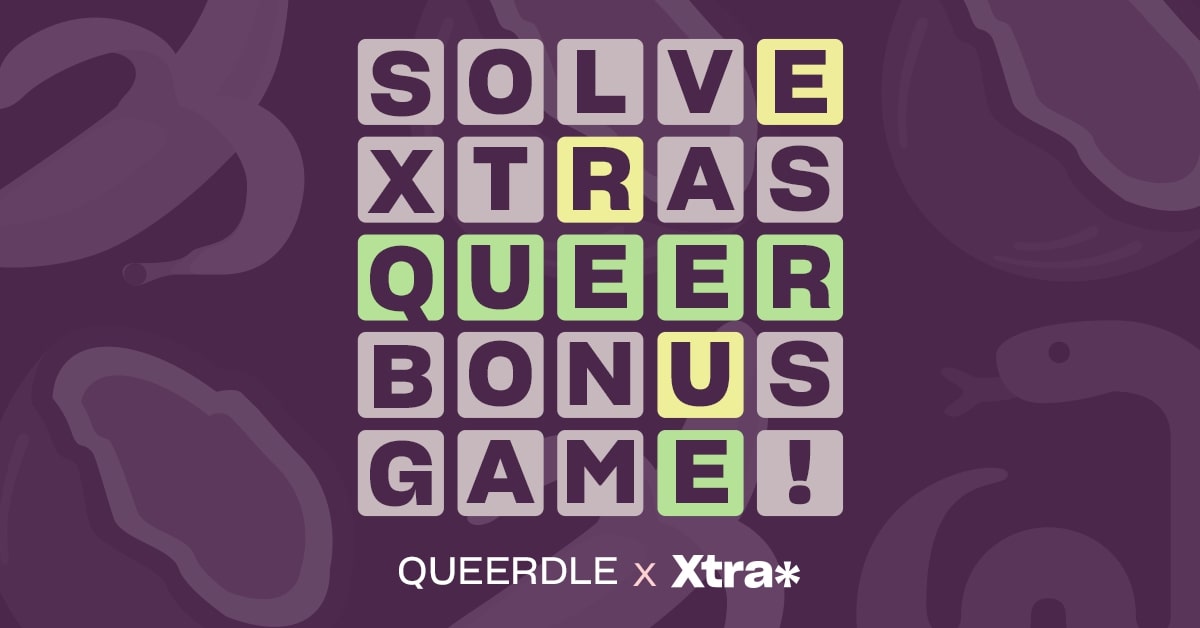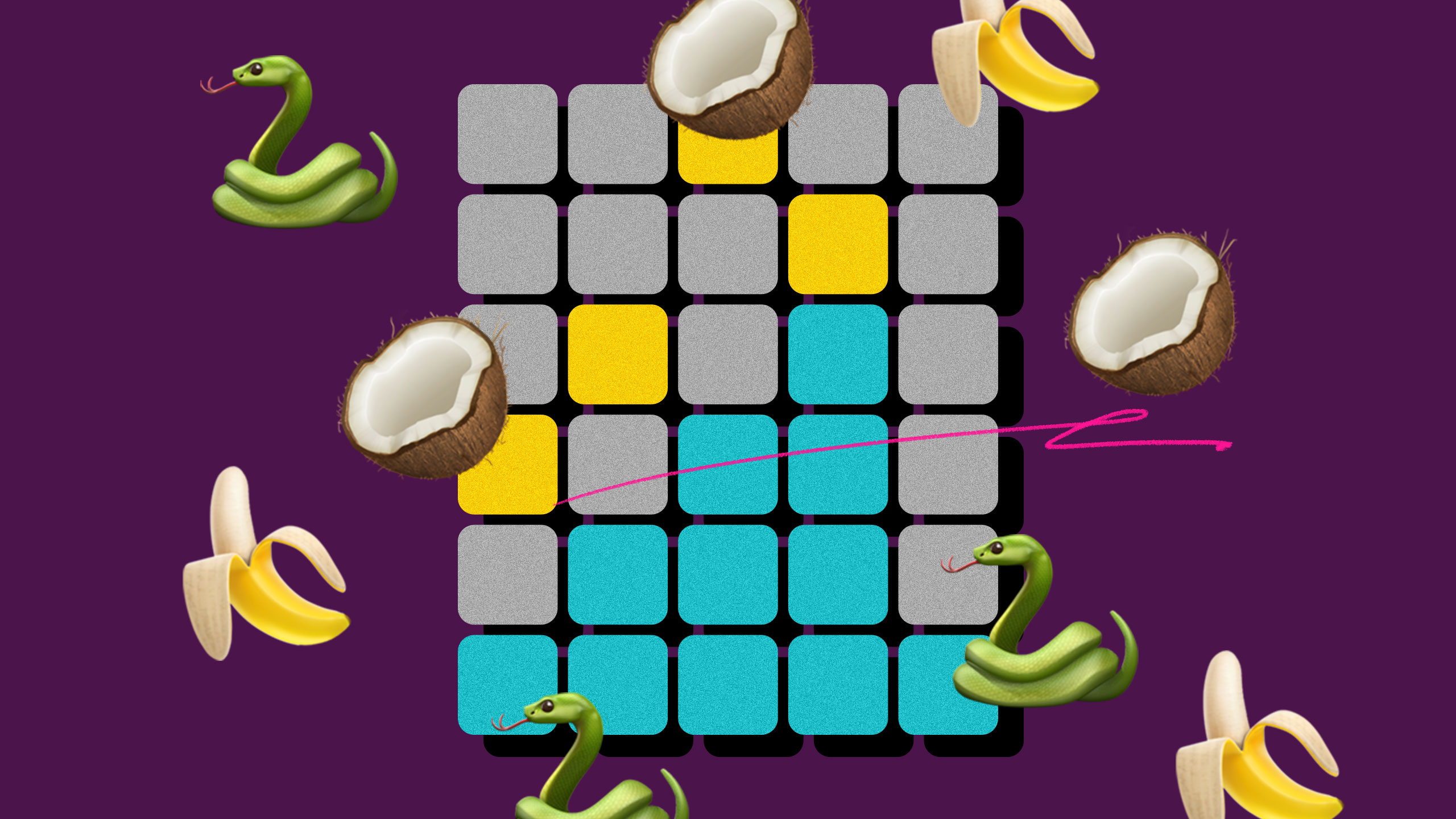After the web-based word game Wordle went viral in early 2022, it was almost inevitable that myriad clones of the popular puzzle would follow. Out of those copies, few have been able to make their mark in a unique way; even fewer have been able to create a playful digital space for members of an oft-marginalized community.
But Queerdle, a Wordle-esque game created by Chicago-based, 38-year-old computer programmer Jordan Bouvier, has become exactly that, and queer people can’t get enough.
“It’s a fun and powerful thing to be able to create something,” Bouvier tells Xtra.

For the uninitiated, the game’s inspiration, Wordle, has become a global phenomenon, gaining significant traction since its November 2021 debut. (On Jan. 24, 2022, the game boasted 3 million players worldwide, and it was recently purchased by the New York Times for seven figures.) A non-app, website-based game that could be described as a mix between the code-breaking tabletop game Mastermind and Hangman, the goal of Wordle is to figure out the five-letter word-of-the-day in as few tries as possible.
Unlike app-based games that come loaded with a litany of endless levels, Wordle’s allure is its one-and-done approach. Many have attributed its popularity to a mix of social media sharing and a unifying struggle staked on a single word, creating a conversational origin point. (The ongoing pandemic has also aided in this.) The game has also spawned a number of creative knock-offs like Lewdle, which picks its word-of-the-day exclusively from an NSFW lexicon; Absurdle, a more aggressive form of the game that changes the word as you’re playing; and Dordle, in which players guess two words at the same time.
As Bouvier tells it, Queerdle came about from two of their main obsessions: tinkering and joy. “I love puzzle games, low-stakes games, games that don’t require super rapid hand-eye coordination—I’m very drawn to meditative games,” Bouvier says. It was during a January 2022 trip to New York to visit family that Bouvier found themselves reading over the programming makeup for a Wordle copycat, one made available by way of the website Glitch.
Bouvier began to wonder: What if the words could be longer or vary in length from day to day? Or better yet: What if they could send their own version to their friends? “It’ll be pretty fun,” they thought to themselves, “I’ll put in words that make them laugh.”
“Without warning, Bouvier found themselves in a strange role: a steward of a queer online community.”
After receiving positive reviews in a group chat, Bouvier posted Queerdle on Twitter a day later. According to data Bouvier provided to Xtra, around 275 people played the game the day of its Jan. 6 debut. By the end of that week, the number had increased to 15,000 and, as of this writing, roughly 23,000 to 25,000 users from around the world solve the daily puzzle each day.
Without warning, Bouvier found themselves in a strange role: a steward of a queer online community. Right off the bat, it was important to them that Queerdle include words related to all facets of the LGBTQ2S+ community. It quickly became clear that the game would need something to provide context for each word, especially after Bouvier realized not everyone was puzzle-solving within the same queer cultural context.
Take the past word-of-the-day, “Paris.” Bouvier figured that players would understand it as a frank allusion to the 1990 documentary Paris is Burning, which explores the lives of BIPOC trans women and queer men in New York City’s ballroom culture. Instead, a number of Queerdle aficionados balked at the selection. They had no idea why, as Bouvier puts it, “the most cishet city in Europe” would be chosen for a game specifically targeting an LGBTQ2S+ audience.
Seeking answers, Bouvier found a solution by playing Tirtl, a queer Wordle clone created by the LGBTQ2S+ website Autostraddle that uses a contextual nugget feature. Now, after Queerdle players decode the day’s word, a GIF or informative link appears explaining the meaning behind the term—like one to help define “Dragula,” a popular Drag Race-style competition show, or “Compton,” the site of 1966 protests against police brutality.
“I thought it was so cool that they had a little tidbit or explanation about the word,” Bouvier says of Tirtl’s post-game snippet. “I don’t feel bad about copying them because, hey, we’re sharing back and forth!”
The way Queerdle and Tirtl have built community is reminiscent of the way LGBTQ2S+ have carved out digital space for themselves for decades. Since the early days of Geocities and AOL Messenger, the internet has offered an alternative to the mainstream narrative of queer life as lonely, instead offering the ability to connect to others on an unprecedented scale.
“I grew up in a very small town,” Bouvier recalls. “It wasn’t a happy place for little queer Jordan to be growing up. I completely sought out friendships and knowledge on the internet. I didn’t even realize other gay people existed other than in San Francisco, certainly no one in my little town.”
Queerdle is a natural extension of those experiences, according to Bouvier. “For me, this is my one chance a day to have a little bit of fun and a little bit of levity,” they say.
In doing so, Bouvier has created a space for so many queer people who might otherwise feel isolated during a still-raging global pandemic. Every Queerdle player becomes part of a boundless queer community, even if just for a brief moment while learning about Divine, John Waters’ muse and frequent collaborator. It may be just a row of empty spaces, but Queerdle is something much bigger: a distillation of pure, queer joy.


 Why you can trust Xtra
Why you can trust Xtra


